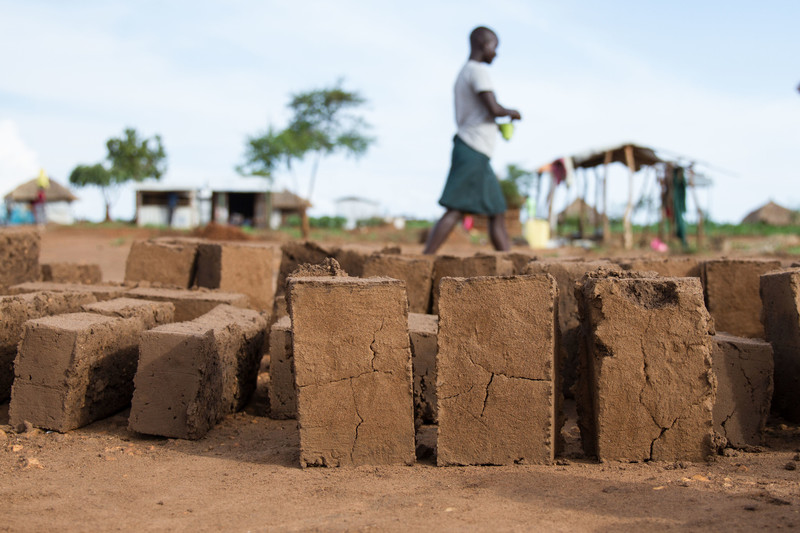Haley’s “America First Foreign Assistance Policy” will only lead to greater poverty and humanitarian crises
 Bricks, made by packing mud into wooden forms and then removing it to dry in the sun, serve as a basic building material for homes and latrines across the Bidi Bidi refugee settlement in Uganda. Refugees from South Sudan have been fleeing conflict and hunger in their country, and seeking safety across the border in Uganda. As of early June 2017, Uganda was hosting more than 900,000 South Sudanese refugees and asylum seekers. (Photo: Coco McCabe / Oxfam America)
Bricks, made by packing mud into wooden forms and then removing it to dry in the sun, serve as a basic building material for homes and latrines across the Bidi Bidi refugee settlement in Uganda. Refugees from South Sudan have been fleeing conflict and hunger in their country, and seeking safety across the border in Uganda. As of early June 2017, Uganda was hosting more than 900,000 South Sudanese refugees and asylum seekers. (Photo: Coco McCabe / Oxfam America)
Basing US foreign aid allocations on countries’ UN voting records is preposterous and vindictive.
On the day Donald Trump was inaugurated as the United State’s 45th President, Oxfam America’s former President Ray Offenheiser wrote, “The moral poverty of the America First idea lies in the false choice it presents to all Americans: are you a part of the American family or the human family?” When these words were written, the “America First” doctrine was still just a worrying and divisive idea, merely a threat to American values and America’s role in the world. But now, a little over a year later, “America First” is having a clear influence on US decisions about foreign assistance.
Last week Foreign Policy described a push by the US mission to the UN, under the leadership of Ambassador Nikki Haley, to make US foreign aid contingent on countries’ support for American policies and American interests. Specifically, Haley argues the way countries vote in the UN—or more explicitly, whether their votes are aligned with US votes—should be a determining factor in how much assistance the US gives them or whether the US gives them any foreign assistance at all. The exposure of this memo, titled “America First Foreign Assistance Policy”, is a recent development and moves the Trump administration closer to its early America First rhetoric and threatens critical US efforts to combat global poverty.
The President’s first budget request (FY2018) included an unprecedented 32 percent cut to the foreign assistance budget – which Congress thankfully rejected last week – and the administration’s recently-released budget request for FY2019 includes an additional 30 percent cut to poverty-fighting assistance programs. This new proposal to base the US’s decisions around foreign aid allocations on countries’ UN voting records is preposterous and vindictive. We should not punish every day citizens who are facing poverty and crisis because of the way their governments vote on global issues.
Of course, national security and American interests have been and always will be a factor in how much and to whom US aid is given; but tying US foreign assistance more closely to these aims over the elimination of poverty and building self-sufficiency will only make US foreign aid programs less effective in achieving any of it. The America First doctrine and the UN memo present two options for how the US can engage with the world – one that preferences US interests and one that preferences global interests. But what they don’t recognize is that these options are not mutually exclusive. As Mr. Offenheiser put it, “…we unapologetically value global security and prosperity, starting with the poorest and most vulnerable. And at the same time, we acknowledge the unique responsibility that the US government has to protect and represent US citizens even as it works to advance the global good….[Oxfam] simply does not see the contradiction in or feel the tensions of a multilayered identity that accommodates both US and global citizenship.”
The Foreign Policy article indicates that the nation of South Sudan is specifically mentioned in the memo since it receives a large portion of US foreign aid but only votes with the US 47.9 percent of the time. There is good reason that South Sudan is one of the US’s top 10 aid recipient countries: the conflict in that country has left 6.3 million people hungry and hundreds of thousands displaced, and the US was one of the greatest international supporters of its independence. If anything, South Sudan is a prime example of the humanitarian imperative of providing assistance based solely on need, not politics. In order to ensure the situation there doesn’t worsen both the quality and quantity of humanitarian and development aid should increase – millions of lives depend on it. In fact, millions of lives across the world depend on US foreign assistance, and matching our investments with where the needs are the greatest is an effective way of making this world safer and more prosperous. It also aligns with American values, demonstrates the goodwill of the American people, and sends a clear signal to developing country partners that the US is a good ally – instead of a self-interested bully.
The US should not use foreign assistance as a reward system for countries that vote in favor of our interests. Rather, it should focus on making its aid more effective, target it to communities who need it the most, ensure it contributes to gender equality and women’s empowerment, and ensure it leads to lasting change by empowering local actors. That would make the world better for everyone—including Americans.